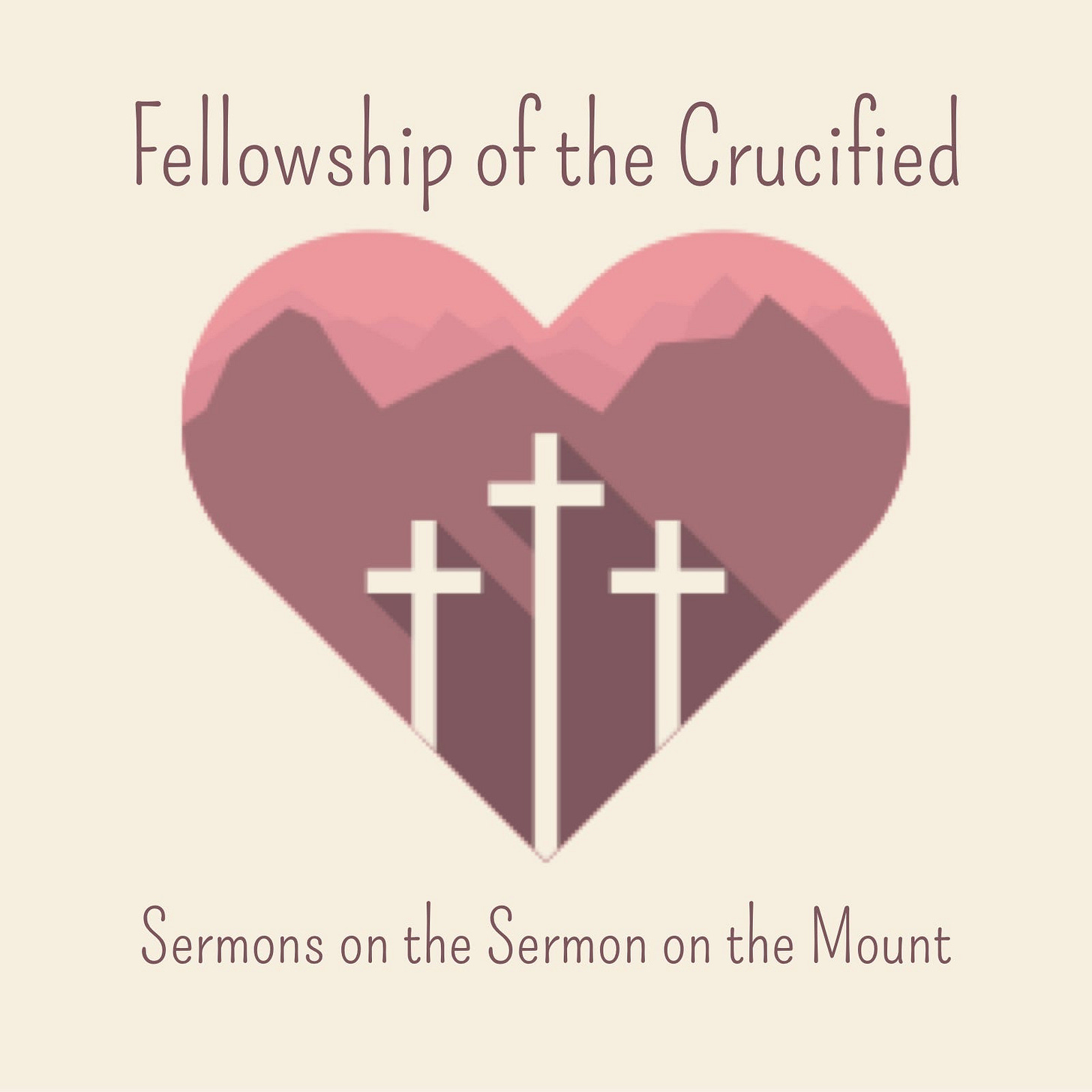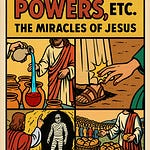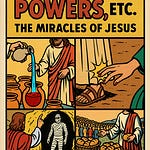Matthew 6.5-15
Back in the spring, I celebrated a wedding in Landsdowne. On my way home, I stopped at the store to pick up some groceries for dinner. I got out of my truck and walked a few yards through the parking lot.
And then I saw her. More importantly, she saw me.
Because of the wedding, I was wearing my clergy collar underneath my charcoal suit. Great, I thought, if I don’t let her lighten the load in my wallet then I’m stuck playing the bad guy in an updated version of Jesus’s most famous parable. “A United Methodist pastor in a fancy suit saw the woman in the ditch and passed by on the other side.” I cursed the Lord for his sense of humor and walked the rest of the way through the parking lot.
She was maybe thirty with dark hair tied in tight braids. She was sitting on the sidewalk by the steps leading up to the sliding glass doors of the supermarket. Her back was against the brick wheelchair ramp and her legs were crossed. On her lap she had a cardboard sign made from an Amazon delivery box. In black Sharpie, the sign had the usual tearjerker shakedown which may or may not have been legit.
“Look,” I said, “I’m so sorry. I don’t have any cash on me.” And I opened up my wallet so she would see that while I may be a professional Christian I’m at least no more hypocritical than your average one.
“Tell you what,” I offered, “if you tell me what you’d like, I could go inside the store and buy you some food with my card.”
“It’s okay,” she said.
“No, really, I don’t mind,” I lied.
“It’s okay,” she said again.
“It’s okay?” I asked.
“It’s okay,” she explained, “I take Venmo.”
“You take Venmo?”
She nodded.
“But if I send you money on Venmo, then you’ll have my phone number,” I said, and didn’t add, “And then I’ll be pulled into a relationship with you and who knows what in the world you’ll demand from me next or what sorts of problems I’ll get sucked into.”
“Yes,” she replied matter-of-factly.
Grocery carts rattled down the ramp and the sliding glass doors whooshed open and shut as I struggled to negotiate the app on my phone and send her some money. It wasn’t as much as the samaritan forked over for the man in the ditch but it was more than it would’ve been had I been carrying some hard currency. I slid the phone back in to the breast pocket of my suit, nodded to her, and took a step towards the doors when she said to me, “You can pray.”
“What was that?”
“Pray. Will you pray?”
“You want me to pray?”
She nodded, “Anyone can give me money or food. You should pray.”
“Like, here? Right now? With all these people around? Look lady, I like to keep work at work.”
She ignored me and held out her hands, forcing me to kneel down in front of her. I took her hands and hoped she wouldn’t notice that mine had started to sweat. I began with the garden variety pastoral patter and then decided to pivot to her.
“Lord,” I said, “in your mercy, I ask that you would hear this woman’s prayers…” and I squeezed her hand to signal that it was her turn to speak.
“Help,” she said.
“Our Father in heaven, hallowed be your name. Your kingdom come. Give us our bread for tomorrow. And forgive us our sins, for we ourselves forgive everyone indebted to us. And do not bring us to the time of trial.”
That’s it.
That’s the whole prayer.
It’s just thirty-eight words in Greek.
Jesus doesn’t even trifle with an amen at the end.
In the Gospel of Luke, the prayer the Lord commands us to pray comes not in the context of the Sermon on the Mount but in response to a question, “Lord, teach us to pray.” John the Baptist taught his followers prayers to pray, they say. Teach us how you want us to pray. It’s the only time in any of the Gospels that the disciples ask Jesus for a teaching. And Jesus responds by giving them a prayer that is distinctive only in its dearth of content. Luke’s form of the Lord’s Prayer is far shorter even than Matthew’s version, almost twenty words trimmer. Just as in Matthew where Jesus gives his prayer as an alternative to the ways the pagans pray, in Luke Jesus teaches the prayer in order to distinguish his Gospel from John the Baptist’s fire and brimstone. “His winnowing fork is in his hand,” John had preached, “and he will thoroughly clear his threshing floor; and he will gather his wheat into the barn, but he will burn up the chaff with unquenchable fire.” Remember John’s entire message had been turn or burn: repentance from sin, moral uprightness, righteousness and holiness according to the straight and narrow of the commandments.
John preached the Law.
Uncut, undiluted, one hundred proof Law.
You can imagine the Prayer School taught by a preacher who wears a camel hair coat, carries nothing but locusts in his lunchbox, and has only a single harrowing arrow in his sermonic quiver. Judging from the alternative Jesus offers the disciples, John taught his followers to pray in a manner commensurate with his unyielding message.
For someone like you—
If prayer is to have any hope of working it must be work.
Roll up your sleeves.
Put your back into it.
Wade into the woe-is-me.
Fess up.
Throw yourself on God’s mercy.
Beg, plead, bargain.
And do not bother getting up until you’ve worn holes in your prayer rug. The Holy and Righteous God is not in the mood to shower favor upon a sorry sinner like you. The Lord’s going to require some convincing.
By contrast, when the disciples ask Jesus for an alternative way to pray, Jesus gives them not only a prayer that is the barest of bare bones, he gives them a prayer that is centered in and premised not on the Law but on God’s grace. “Whenever you pray, say this,” Jesus instructs them, “Our Father in heaven…” You don’t need to crawl your way to the throne, heaping divine appellations and biblical flattery upon him. From your first breath, you are free to address the Maker of Heaven and Earth not as One with whom you must earn or deserve a relationship but as One to whom you are related already by virtue of the Son. Because of the Son, the Mighty One of Israel is now for you more like a Mother. You are more than creatures of God. You are the Father’s children, brothers and sisters of the only begotten.
The Lord, therefore, is NOT A RELUCTANT LISTENER!
Because of the Son, he is your Papa. Because he’s your Papa— maybe (like me) the only good one you’ve ever had— he is already predisposed to show you love and mercy and favor. You are his beloved; you don’t need to bargain. He is your Parent with a capital P; you don’t need to plead.
Don’t be coy. Don’t be shy. Don’t dicker around. Just come right out with it. Tell him what you need. He wants to hear from you and to help you. In fact, Jesus says, just as a reminder to you that the Lord is a cheerful giver, whenever you pray, say this, “Give us our daily bread…forgive us our sins…do not bring us into trials.”
Notice, those are imperatives: give, forgive, bring not.
Those are all imperatives. They are commands.
In other words—
You can so rest in the Gospel, you can be so confident in the promise of God’s grace, that you can speak to God in the language of the Law.
You can lay demands on him.
You can exhort him.
You can command him to act on the basis of his grace for you.
Give us what we need.
Forgive us what we’ve done.
Do not leave us to be sorely tried.
And that’s it.
Jesus ends the prayer there.
It’s just thirty-eight words.
There’s no plaintive pleadings. There’s no prayer rug persistence or contrite persuasions. There’s no piling on the praises. You don’t need to be a supplicant or a sycophant.
Whenever you pray, Jesus teaches, pray like this:
Call him Daddy. Tell him what you need. That’s it.
It’s as if prayer is not much.
Not much more than staking a claim upon the promise of God.
“Help,” the beggar woman with the cardboard sign on her lap prayed in front of the supermarket.
I waited a few beats for her to continue.
And then I peeked through my closed eyes to see if she was searching for the right words or waiting on me— she hadn’t squeezed my hand.
The sidewalk dug into my knees.
“Um,” I whispered to her, “Do you want to say more? Elaborate? Add anything else to your prayer.”
She smiled and nodded like she was foolish for having forgotten something.
“Help me,” she prayed.
And then repeated it, “Help me.”
She squeezed my hand.
So I said, “We offer this and all our prayers to you, Lord, with the words you taught us to pray.”
She prayed Jesus’s prayer all right along with me.
She said debts instead of trespasses.
Two days later she messaged me, “Pray for me?”
“What should I pray?”
“Pray for God to help me.”
I didn’t know to what she referred.
She seemed confident God knew.
A couple of days later she asked me to go to Fairfax Hospital, to the Pediatric ICU, to pray over her daughter.
“Help her,” her text message read the next night.
It wasn’t until this week that I realized that was basically a perfect prayer.
“Prayer,” Martin Luther says, “does not cause hard work.”
In both Gospels in which it appears, Jesus gives this model prayer as an alternative to the ways that religion misconstrues the practice of prayer. As familiar as it has become, the Lord’s Prayer is an attack on the misconception of prayer that there must be MUCH of it in order for it to work.
The pagan rule of prayer— and, we can presume, John’s rule of prayer— was MUCH.
By contrast, Jesus’s anti-rule of prayer is NOT SO MUCH.
Not so much— because the One in heaven is your Father.
Not a lot— because the Son has made you a child.
Call him Daddy.
Tell him what you need.
That’s it.
You’re free.
Get in. Get out.
Unless, of course, you want to say more.
In which case, you’re free.
One of the most valuable lessons a reader can glean from the four Gospels is to notice what is missing from them.
For example, there are no prayer times in the Gospels.
Neither Matthew nor Luke, neither Mark nor John, report an instance of either Jesus or the disciples adhering to Israel’s prescribed daily prayer regimen.
As good Jews, Jesus and the disciples should be praying the Amidah, the Eighteen Benedictions:
Blessed are You, O LORD our God and God of our fathers, God of Abraham, God of Isaac, and God of Jacob, the great, mighty and awesome God, the most high God, Who bestows grace and creates all, and remembers the kindness of the Fathers, and brings the Redeemer to their children’s children, for His name’s sake with love.
O King, Helper, Savior and Shield, Blessed are You, O LORD, Shield of Abraham.
That’s only only one of the Benedictions.
There’s seventeen more.
In total, they’re longer than this sermon thus far, and Jews in Jesus’s day were required to pray all eighteen of the Amidah not once but three times a day.
In addition, the Law requires Jews to pray the Shema twice a day, "Hear O Israel, the Lord is our God, the Lord is one. And as for you, you shall love the Lord your God with all your heart, with all your soul, and with all your strength.” On top of the Amidah and the Shema are the three obligatory table graces for each meal of the day; so, nine in total, along with relevant doxologies. And don’t forget the three psalms they were expected to pray every day too.
That’s a lot of time and oxygen and memory muscle to expend on prayer.
It tells you everything you need to know about John the Baptist’s project that he evidently thought it a good idea to add to it.
But Jesus appears to have observed none of it.
“When you pray,” Jesus instead teaches, “pray like this…” and he gives them just thirty-eight words.
Fifty-seven in Matthew.
Jesus brings freedom.
Jesus brings freedom even to prayer.
As New Testament scholar Frederick Dale Bruner notes, “The people of God in Jesus’s time were confronted by Jesus not as a prayer-less community but as a people overburdened with prayer.” In other words, we get the goodness of God by grace not by activity. We get the goodness of God not by the number of our words, the sophistication of our vocabulary, or our grasp of the scriptures but by grace of Christ and him crucified.
Therefore, the Protestant Reformers said, the only rule for prayer is that our prayers be “brief, frequent, and intense.”
“Father, forgive them, for they know not what they do.”
“Lord, I believe; help my unbelief.”
“Lead me not into trials.”
Brief, frequent, and intense.
“God,” Luther preached, “has no need for your everlasting twaddle.”
Instead the foundation to prayer, Jesus teaches, is not how or how much but grace.
Because the One in heaven is your Father, the care-package you need is already in the mail. And there is no return address. You don’t need to convince him.
When it comes to praying, Jesus says, you don’t need to do much because
A) The Father’s already shamelessly, hopelessly, irrevocably for you and
B) He already knows your need before you name it.
Jesus brings freedom even to prayer.
Jesus frees you from needing to worry about the form your prayer takes or the time you spend in prayer or the information you relay in prayer.
Because the Father is good, the MUCH of prayer is not required.
Because the Father is God, the information is not necessary.
Because the Father is good, the MUCH is not required.
Because the Father is God, the information is not needed.
Several years ago, upon release of her memoir, Lit, the Paris Review interviewed the poet Mary Karr.
“Do you have any writing rituals, things you have to do in order to write?” the interviewer asked Karr.
And the poet replied:
“I pray. I ask God what to write. I know that sounds insane, but I do. I say: What do you want me to say? I have a sense that God wanted these books written. That doesn’t mean they’re meant to be bestsellers. Nor am I hearing voices.
But a lot of times I’ll get stuck and I’ll just say, Help me.
A nonbeliever might think of it as talking to my superego, or some better self. But I do have a sense of being guided…
Otherwise, I do a lot of begging. I just beg, beg, beg, God, beg like a dog, for myself and those I love. And I do the cursory, “If it’s your will . . .” but I’m not fooling him with that “If it’s your will” shit.
God knows that I want everything when I want it. He knows I’m selfish and want a zillion bucks and big tits and to be five-ten.”
To make sure we refrain from hearing his prayer in the wrong register, in terms of Law instead of Gospel, in Luke Jesus hasn’t even put a period on the prayer before he launches straightaway into a parable— a parable of grace— that serves as Christ’s interpretation of his prayer.
Let’s say you have a friend a few doors down, Jesus says, and around midnight you knock on your friend’s door.
The in-laws have shown up at your house unannounced and your wife’s old man informs you in his unsubtle way that he’s hungry from the roadtrip. But your stock is empty and your shelves are bare so you knock on your friend’s door and ask him if you can borrow the fixings for a charcuterie board or a pastrami sandwich.
Look, the friend says, I’m half-asleep. You woke the baby and now I’m going to need to let the dog out too, but, fine. Whatever, your friend says as he rummages in the fridge and looks in the crisper. Here’s a nice block of Manchego, a stick of Soppressata, and a nice bottle of Chianti. That should make the old man forget that he wished his daughter had married a doctor.
Your Father with a capital F, Jesus tells the disciples, your Papa in heaven is an even better friend than that friend at midnight.
There’s no cajoling or caterwauling or guilt-tripping necessary. You don’t need to ask and ask and ask. You don’t need to seek and seek and seek without end. You don’t need to bloody your knuckles knocking on his door.
Just ask, seek, knock.
Just once.
Like the prodigal father sitting on the front porch rocker waiting for his son to show on the horizon, this Father, your Father, is always ready to hop out of bed in socks and boxers to do you a solid.
So what’s stopping you?
From praying?
For his recent movie, Father Stu, the actor Mark Wahlburg gave an interview in which he shared that he attends Mass every morning and talks to his priest in Boston at least once a week.
In the interview he said, “Yeah, Father Joe, I just built him a gymnasium at the Catholic School where I was a student.”
The reporter asked him, “How did you decide to be such a devout Christian?”
Mark Wahlberg replied, “I didn’t get to decide. Father Joe made me do it.”
And the reporter responded, “Oh, well, tell us more about it.”
“I grew up kind of rough. On the streets. When I was sixteen, some of my buddies and I stole a car. We went out in that car and we wrecked it. The police got us. So there I was in court, and my parents were so embarrassed they didn’t even show up in court for me.
The court had assigned me some attorney who couldn’t even remember my name. When it came time for the judge’s verdict, this attorney leaned over to me and said, ‘Son, you’re going to prison.’
It was just awful. I was sitting there just terrified.
And the judge said, ‘Now…’ and just then a voice from behind me said, ‘Your honor, could I approach the bench?’
And the judge looked up and said, ‘Oh, Father Joe.’ I looked around. The only person in court was Father Joe, and he was there for me.
Father Joe went up to the bench and said, ‘Your honor, you being a Catholic— though, not a very good Catholic— surely you know our Lord Jesus believes in mercy. This young man— no good is going to come from sending him to jail. He messed up bad, sure. But I’m telling you, judge, give him to me. Let me have him. I’ll make sure he never ends up here in this courtroom again.
And the judge said, ‘Alight, Father Joe. If you’re going to take responsibility for him and watch over him, I’ll agree to do that.
We got out of the courtroom and we were standing on the front steps and I choked up, ‘Father Joe, that was the most wonderful…no one’s ever done that for me…that was the first time in my life anyone’s ever looked out for me…anyone offered to help me…
Just then, Father Joe caught me right on my left jaw. He hit me and I fell down on the steps. And he said, ‘You sorry little brat. You ever pull a stunt like that, I’m going to kill you. Just remember, I own you. What I did for you…you’re mine. You belong to me forever.’”
Here’s my point:
God is just like Father Joe.
You are his. You belong to him. He owns you.
Therefore:
No matter what you’ve done, when you pray, whenever you pray, with the confidence of a child of God you can be so bold as to say, “Father…help me.”











